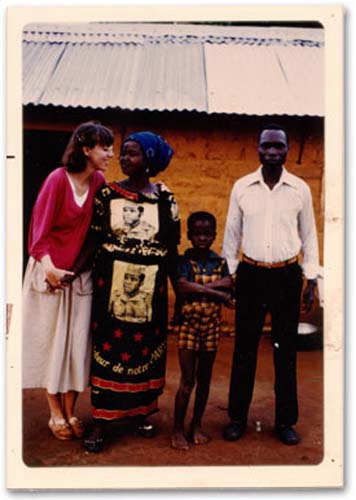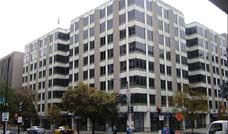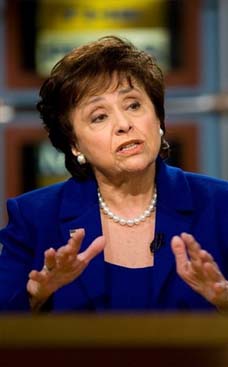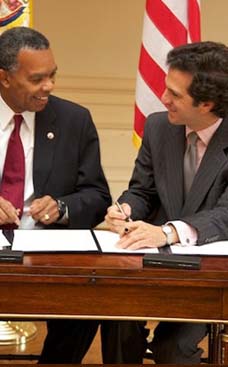
Our salaries, a pittance by U.S. standards, put us among the affluent in Dekoa, the village where I lived during my first year in the Corps. More powerful, perhaps, was the undertone of even greater wealth that was never far from the surface: The periodic caravans of Peace Corps officials, passing through in Jeeps and delivering care packages from our friends and families; photos of home that showed nearly unfathomable excess, by comparison to our African neighbors; and the knowledge that after our relatively brief stint of service, we'd be returning to this land of plenty. One of the most common questions I heard from Africans while I served as a volunteer could be roughly translated to this: With all that you have at home, what the hell are you doing here? In fact, for most volunteers I knew, the reasons had more to do with adventure and career ambitions or lack thereof than the more noble goals espoused by Peace Corps officials. Many volunteers were recent college graduates who either didn't know what they wanted to do with their lives, or who knew they wanted a career in the foreign service, and viewed the Peace Corps as a way to pay their entry-level dues. Though we were often accused of being CIA operatives, which I found to be both hilarious and unnerving, in fact the volunteers I knew who were on a career path were more likely destined to be bureaucrats than spies. And being an American bureaucrat in a Third World country wasn't a bad life, from what I observed. Peace Corps administrators in the Central African Republic lived in spacious homes with servants, were provided with a car and a driver, entertained frequently, and spent considerable time being courted by African officials who were eager to profit from whatever U.S. aid was available. Aside from fairly common gastrointestinal issues when volunteers gathered, we talked a lot about the color and texture of our bowel movements life in that strata was hardly a hardship. But more than that, serving in the Peace Corps even at higher levels conferred a status on people who would be unremarkable if they held similar jobs stateside. I squirmed whenever someone told me they thought I was brave or selfless or somehow worthy of praise just for being a Peace Corps volunteer. Would they have offered the same praise if I'd been teaching English in inner-city Detroit or rural Mississippi? Maybe, but not as likely. So being involved with the Peace Corps clearly benefits the volunteers and other paid staff. There are also benefits I haven't mentioned, like the ripping away of assumptions that forever transformed my perspective on the world. Not everyone has easy access to potable water? This was a revelation for a young, middle-class Midwesterner like me. More profoundly, living for two years in Africa grounded my belief in the common ties of humanity: a love of family, the ability to laugh at the absurd, to feel the heavy hand of sorrow, to struggle for a better life all of the things that show how we're more alike than our differences might mask.
RPCV Mary Morgan writes: Some thoughts on the program's 50th anniversary
Column: Practical Ideals and the Peace Corps
Some thoughts on the program's 50th anniversary
By Mary Morgan
October 16, 2010
Caption:
A photo taken in 1985 with the Moudyoutenday family at the start of my Peace Corps experience in the Central African Republic. I'm the one looking the least dignified.
Fifty years ago this week, I was a few days away from ending nine months of gestation in my mother's belly which is to say, on Oct. 14, 1960 I wasn't among the throngs gathered in front of the Michigan Union at 2 a.m., enduring fatigue and drizzling rain to hear John F. Kennedy give a campaign stump speech.
But 25 years later, my life was tightly intertwined with that speech, though I didn't know it at the time. In October of 1985 I was a Peace Corps volunteer, fumbling my way through the first few weeks of life in a mud hut, learning to accept rats and roaches as daily encounters, realizing how much I missed American toilets teaching English, of all things, to youngsters in the impoverished Central African Republic.
It was a transformative two years for me but not in the way that recent hagiographic celebrations of the Peace Corps' 50th anniversary might have you believe. In fact, I emerged from the experience with ambiguous feelings toward the Corps, and specifically toward the mythos that's arisen around it.
I was struck by that ambiguity again on Thursday morning, as I listened to speakers on the steps of the Michigan Union describe with such certitude the pivotal role that the Peace Corps plays in fostering world peace. It gets to the crux of my discomfort with this message: While I believe wholeheartedly that the program benefits the mostly single, middle-class, recent college grads who make up its ranks, I'm much less convinced of its lasting positive impact on the countries where volunteers serve.
A Volunteer's Life
So if the big picture is a goal of world peace, what are the pixels that make up that composite? On a daily basis, mundane things consumed our time as Peace Corps volunteers. Fetching and purifying water was a Herculean effort, as was buying and preparing food. It's one reason why most volunteers hired help in that way, we made a concrete contribution to the local economy, at least.

In fact, the direct economic incentives for communities to have Peace Corps volunteers stationed there were formidable. The head of the school where I taught also got rent from me and my roommate another volunteer for our small hut. My understanding was that the headmaster "helped" with the housing of most volunteers who passed through the school every two years, providing him with steady, supplemental rental income. My guess is that this was of far greater value to him than anything we brought to the classroom, where on any given day 50% of the students skipped class, out of necessity, to work the fields. Bear in mind, this was an elementary school.
We also hired someone to cook on weekdays, and to do our laundry. This was common practice among volunteers in that country and elsewhere. And on the advice of just about everyone, we also hired a "sentinel" to stand guard over our home at night or rather, to sleep in a chair outside the door as a deterrent to thieves and snakes.
Our salaries, a pittance by U.S. standards, put us among the affluent in Dekoa, the village where I lived during my first year in the Corps. More powerful, perhaps, was the undertone of even greater wealth that was never far from the surface: The periodic caravans of Peace Corps officials, passing through in Jeeps and delivering care packages from our friends and families; photos of home that showed nearly unfathomable excess, by comparison to our African neighbors; and the knowledge that after our relatively brief stint of service, we'd be returning to this land of plenty. One of the most common questions I heard from Africans while I served as a volunteer could be roughly translated to this: With all that you have at home, what the hell are you doing here?
In fact, for most volunteers I knew, the reasons had more to do with adventure and career ambitions or lack thereof than the more noble goals espoused by Peace Corps officials. Many volunteers were recent college graduates who either didn't know what they wanted to do with their lives, or who knew they wanted a career in the foreign service, and viewed the Peace Corps as a way to pay their entry-level dues. Though we were often accused of being CIA operatives, which I found to be both hilarious and unnerving, in fact the volunteers I knew who were on a career path were more likely destined to be bureaucrats than spies.
And being an American bureaucrat in a Third World country wasn't a bad life, from what I observed. Peace Corps administrators in the Central African Republic lived in spacious homes with servants, were provided with a car and a driver, entertained frequently, and spent considerable time being courted by African officials who were eager to profit from whatever U.S. aid was available. Aside from fairly common gastrointestinal issues when volunteers gathered, we talked a lot about the color and texture of our bowel movements life in that strata was hardly a hardship.
But more than that, serving in the Peace Corps even at higher levels conferred a status on people who would be unremarkable if they held similar jobs stateside. I squirmed whenever someone told me they thought I was brave or selfless or somehow worthy of praise just for being a Peace Corps volunteer. Would they have offered the same praise if I'd been teaching English in inner-city Detroit or rural Mississippi? Maybe, but not as likely.
So being involved with the Peace Corps clearly benefits the volunteers and other paid staff. There are also benefits I haven't mentioned, like the ripping away of assumptions that forever transformed my perspective on the world. Not everyone has easy access to potable water? This was a revelation for a young, middle-class Midwesterner like me. More profoundly, living for two years in Africa grounded my belief in the common ties of humanity: a love of family, the ability to laugh at the absurd, to feel the heavy hand of sorrow, to struggle for a better life all of the things that show how we're more alike than our differences might mask.
Then what's the harm, even if the end result is a program that only provides personal growth for individual Americans? Maybe that's enough that we volunteers take away a richer understanding of our world, and carry that with us the rest of our lives. Yet I'm not convinced that those benefits offset the massive U.S. aid-industrial complex that's grown over the past few decades, which seems to foster a culture of dependence and to enrich the developing country's elite more than its impoverished population. At the least, it's a debate worth having.
Something to Celebrate
I say all this to bring a little reality into the whole Peace Corps narrative. The tendency to romanticize is strong, particularly given the program's ties to John F. Kennedy the Peace Corps capitalizes on its association with the idealism embodied in Kennedy's Camelot era.
Bob Dascola
Bob Dascola at the Oct. 14 ceremony marking John F. Kennedy's 1960 speech at the Michigan Union, which Dascola also witnessed.
On Thursday morning, I thought a lot about my own experience in the Peace Corps, as I watched people gather for the ceremony marking Kennedy's Oct. 14 speech at the Michigan Union. Many of them brought their own reflections, having fond memories of being in that spot 50 years ago. They remember Kennedy's charisma, and the sense that they were part of something special.
Bob Dascola, whose barbershop is just a couple of blocks away on State Street, was 14 years old at the time, with generous parents who let him stay out late until Kennedy appeared around 2 a.m. The next day he rode his bicycle alongside Kennedy's motorcade as it left the union that moment was captured by a Michigan Daily photographer and it ran in the newspaper the next day, Bob told me. He remembers it like it was yesterday.
Thursday's event drew a lot of people from the community, like Bob, who also attended a smaller gathering across the street, just before the ceremony on the steps of the Michigan Union. Standing in a tight cluster at the corner of State and South University, they were there to unveil the latest historic street exhibit, a program spearheaded by Ray Detter 11 years ago. If you ask him, Ray will tell you the practical realities of getting this project off the ground took tremendous effort. (Nothing like doing laundry in an African village by beating it against a rock, but still.)
This newest street exhibit marks the Kennedy "Peace Corps" speech, which was actually just some brief remarks that included a general call to international service, as well as a call to help in his presidential campaign. The speech reflects Kennedy's mastery at mixing the practical and the ideal, and it struck me that many people at the event politicians and community leaders like Bob Guenzel, Joan Lowenstein and Leah Gunn, among others often do the same.
And, of course, that's what we do here at The Chronicle, too balancing the idealism of fighting for an open, inclusive government and working to inform this community better, with the practical reality of slogging through a city council report or trying to sell an ad.
It's important that the narrative of our work includes both aspects, because one doesn't exist without the other. I'd hope that more of our elected officials and other community leaders embrace that as well it's important, even essential, to acknowledge the sometimes uncomfortable reality, even if it doesn't meet your ideal, even if it isn't pretty, even if it's sometimes painful to confront that reality in public.
And that's an ideal worth celebrating.













